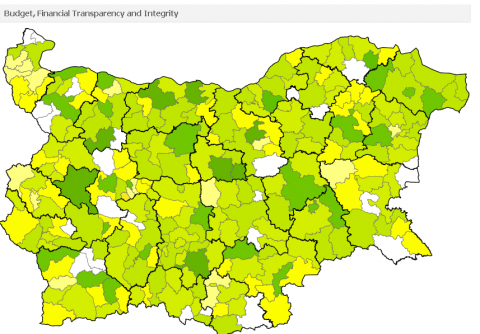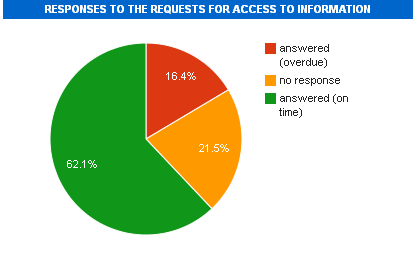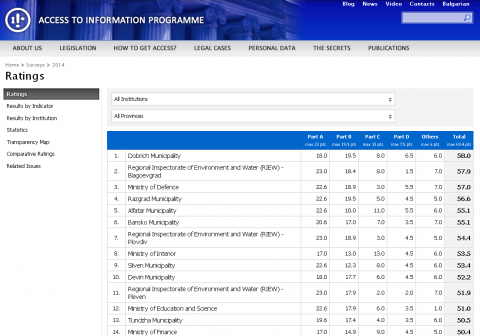2014 Proactive disclosure by Bulgarian institutions
On April 2, 2014, the Access to Information Programme (AIP), a Bulgarian NGO with 18 years of experience in advocacy for access to information, transparent and accountable government, launched the updated 2014 Active Transparency Rating of Bulgarian Institutions. The Rating is based on a set of indicators which assess the level of implementation of obligations for proactive publication of information online under the Access to Public Information Act (APIA) and other laws. The annual audit also evaluates how institutions respond to electronic requests and provide access to public information by e-mail. AIP has been performing the audit since 2006. The indicators are reviewed and updated annually.
The Bulgarian law does not provide for a public body to oversee, control and enforce APIA implementation, including the proactive publication of information online. In the absence of such an authority, the Active Transparency Rating, launched by AIP, serves as a model for public bodies to develop their web sites in line with active transparencyAccording to OGP’s Articles of Governance, transparency occurs when “government-held information (including on activities and decisions) is open, comprehensive, timely, freely available to the pub... More standards and legal requirements for online publication of information and increase their active transparency.
The results of the audit and especially the Rating are met with enormous public and media interest. Over 40 publications, radio and TV broadcasts in national and regional media covered the findings presented last week. Due to increased interest, AIP translated the audit web based module and launched all results in English for the first time.
The focus of the 2014 audit on institutional web sites is the Budget, Financial Transparency and Integrity.
2014 Audit on Institutional Web Sites
- Performed within the period 3 February – 3 March 2014 by 10 researchers (8 from the AIP team and 2 external)
- 534 web sites were reviewed of 535 executive bodies at a central, regional, and local level (including 17 ministries, 28 regional governor’s administrations, 150 regional units of central executive bodies, 66 state commissions, 264 municipalities), and also 3 public-law entities and 7 independent state bodies
- 535 electronic requests were filed for a copy of the last public procurementTransparency in the procurement process can help combat corruption and waste that plagues a significant portion of public procurement budgets globally. Technical specifications: Commitments that aim t... More contract signed by the institution in 2013.
- The indicators were organized in 4 sections – Implementation of Art. 15 and Art. 15a of the APIA (establishing the obligation for proactive publication of information, including online); the Access to Information section; Budget, Financial Transparency and Integrity; and obligations for proactive disclosure of information in the Internet under other legal regulations.
The results for the indicators for the 2014 audit can be found here:
http://www.aip-bg.org/en/surveys/db/2014ii/stats+indicators.php
2014 Budget, Financial Transparency and Integrity Map
As the 2014 Audit on institutional websites focused on Budget, Financial Transparency and Integrity, the 2014 Budget, Financial Transparency and Integrity Map of Municipalities was launched to illustrate geographically the fulfillment of obligations for online publication of budget and financial information and also information related to public officials’ integrity.
Responses to the e-requests
Out of 535 public bodies, 420 responded to the electronically filed request for a copy of the last public procurement contract signed by the institution in 2013. 338 public bodies granted access to the requested information – 278 complete access, and 59 partial access. The issued refusals were 54, while 115 remained silent and did not respond at all.
2014 Active Transparency Rating
- The level of transparency was evaluated on the base of updated 66 (75 for the municipalities) indicators
- The possible total was 69.4 (82.4 for municipalities)
- 2014 Active Transparency Rating was launched on the base of the indicators
- Comparative 2012, 2013 and 2014 Ratings allow for a review of the development of the active transparency of Bulgarian institutions
- New functionality of the web based auditing module allows for the generation of different types of ratings – by type of public body, by administrative region, regional structures and their principal ministry.
Results and findings
The audit results are incorporated from the AIP Information Management System and are for the first time all available in English. The system allows for attachment of the responses of the institutions on the access to information requests and visualizes the results:
The results of the 2014 audit on institutional web sites in Bulgaria show a low level of financial and operational transparency of Bulgarian public bodies.
AIP has also identified the following persisting problems:
- Need for precision of the categories of information subject to proactive disclosure;
- Need for precision of the procedure for active publication of information online;
- Need for the unification of the internal procedures for dealing with the e-requests.
The Bulgarian Government had recognized those needs by including amendments to the APIA as a commitmentOGP commitments are promises for reform co-created by governments and civil society and submitted as part of an action plan. Commitments typically include a description of the problem, concrete action... in its First OGP Action PlanAction plans are at the core of a government’s participation in OGP. They are the product of a co-creation process in which government and civil society jointly develop commitments to open governmen.... However, the measure was not implemented.
April 10, 2014 was the deadline for the submission of proposals by interested parties for new measures to be included in the Second OGP Action Plan of Bulgaria. Interested groups had 8 days to prepare and submit their statements. The discussion on the submitted statements was on 11 April.
The Access to Information Programme, which takes an active part and raises awareness about the Open Government PartnershipThe Open Government Partnership (OGP) is a multi-stakeholder initiative focused on improving government transparency, ensuring opportunities for citizen participation in public matters, and strengthen... More initiative, has submitted its statement recommending the inclusionOGP participating governments are working to create governments that truly serve all people. Commitments in this area may address persons with disabilities, women and girls, lesbian, gay, bisexual, tr... More of specific measures in the Second Government OGP Action Plan regarding enhanced access to public information by means of technologies and increased active government transparency.
AIP recommendations include:
- Signing and ratification of the Council of Europe Convention on Access to Official Documents;
- Amendments to the Access to Public Information Act (APIA) which would provide for:
– Precision of the obligations and increase of the categories of information subject to proactive publication; unification of the requirements and compliance with the standards in the area, including those developed within the OGP initiative and the requirements of the revised Directive 2003/98/EC of the European Parliament and the Council on the re-use of public sector information;
– Systematization and precision of the access to information exemptions;
– Establishment of a specific public body to supervise and coordinate the Access to Public Information Act (APIA) implementation, including the obligations for proactive publication of information.




